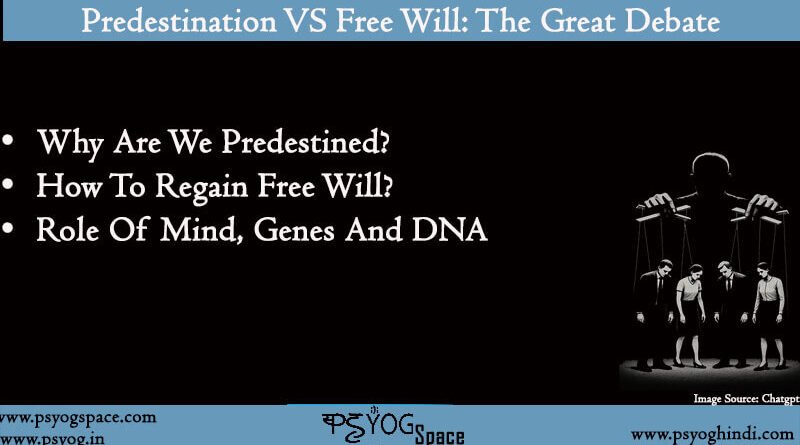Predestination Vs Free Will: Debate, Philosophy, Science, Christianity And Bible Verses
The idea of predestination vs free will has puzzled minds since time itself began echoing with human questions. Are we puppets moved by invisible strings? Or do we pull the strings ourselves—at least sometimes? While people argue endlessly in religious circles, philosophical halls, and quiet midnight thoughts, most miss one simple thing: they never look inward. They discuss Christianity, cite bible verses, attend forums or dive into old-school philosophy, but rarely examine what’s running their choices in real-time. The real debate isn’t out there. It’s within.
Predestination Vs Free Will Philosophy
In the realm of philosophy, this question has never faded. Some thinkers say everything is determined—from the swirl of galaxies to the twitch of your fingers. Others claim you’re free, but only in a way that hurts when you realize you’re the one responsible.
But maybe we’re approaching it all wrong. (Read: Why people suffer success?)
The mind—as most know it—is just a warehouse of old content. Thoughts aren’t fresh; they’re replays. You think you’re deciding something new, but it’s a cocktail of past experience, fears, genetic tendencies, and cultural inputs. Who you think you are might just be a bundle of secondhand knowledge stitched into memory.
That brings us to your DNA, your inherited traits. The nose you got from your father, the temper from your grandmother, the insecurities that trace back generations—they all shape how you act. So, when everything inside is borrowed or programmed, how free are you, really?
From this angle, predestination vs free will philosophy isn’t abstract—it’s personal. If we’re just reacting, not creating, then life is unfolding exactly as it must. Your choices aren’t choices; they’re dominoes in motion.
Unless… there’s something more. Something untouched.

Predestination Vs Free Will Debate
Why do we keep going in circles in the predestination vs free will debate? Why does it exhaust yet never end?
Maybe it’s because we don’t realize we’re debating with the wrong tool: the mind itself. The mind wants certainty. It wants to be right. And in that need to be right, it clings to sides—predestination or free will—never realizing both could be true depending on where you’re looking from.
Let’s say you’re operating entirely through memory, reaction, inherited bias. Then life, for you, is set. A predictable pattern, slightly rearranged. You’re moved by impulses you didn’t design.
But there’s another layer. Call it soul, essence, spirit—it’s that deep part of you that doesn’t echo the past. When you touch this silent space (sometimes through meditation, stillness, pain, or surrender), you find something that doesn’t act from compulsion. It waits. It watches. It chooses.
So the predestination vs free will debate becomes less about arguing theories and more about discovering where you’re living from. If you’re in your conditioned mind, you’re in the scripted movie. But if you’re in your soul, you’re the director.

Predestination Vs Free Will Christianity
Nowhere has this conversation been more passionately argued than within Christianity. Theologians have wrestled with whether God predestines souls or whether salvation hinges on personal choice.
Calvinism leans into predestination—God elects. Arminianism, on the other hand, emphasizes choice—humans accept or reject salvation. But let’s bring it home.
What if both ideas are true on different levels?
Many Christians live their lives on autopilot, thinking belief is enough. But Christ didn’t ask for belief alone. He said, “Die to yourself.” He meant the self made of thought, fear, ego—yes, the mind. He also said, “The kingdom of God is within you.” That inner kingdom isn’t in your logic or personality. It’s in the soul. (Read: Life is Bipolar!)
So within predestination vs free will Christianity, there’s a deeper whisper: God knows the script, but He also gives you the choice to remember who you are. When you live from the soul, not from your mental loops, you’re no longer forced into inherited patterns. Grace flows through freely, and you can walk in the Spirit, not in the flesh.
If you’re living as the false self, life is scripted. But as the real self—your soul—you walk in freedom, even within God’s all-knowing plan.

Bible Verses On Predestination Vs Free Will
The Bible reflects this mystery beautifully. Some bible verses sound like fate is sealed:
“He predestined us for adoption to sonship through Jesus Christ…” (Ephesians 1:5)
“For those God foreknew he also predestined…” (Romans 8:29)
But then come the verses that shout freedom:
“Choose this day whom you will serve…” (Joshua 24:15)
“I have set before you life and death… now choose life.” (Deuteronomy 30:19)
So what’s going on?
Maybe the scriptures are pointing to two levels of human experience. On the level of ego, we’re just replaying reactions—destined. But once we awaken and return to God in spirit, we begin to consciously align with His will. That alignment is a choice. And in that choice, we taste freedom.
So these bible verses on predestination vs free will aren’t at odds. They’re mirrors—showing both what happens when we sleepwalk and what becomes possible when we wake up.
Read deeply, the bible verses say this: God sees it all, but He still waits for your real yes. Not from your conditioned mind, but from your surrendered soul.

Conclusion
After all the pages of history and books of philosophy, after the church doctrines and late-night coffee-shop debates, after reading countless bible verses and exploring Christianity, it all boils down to this:
If you live from your mind, your choices aren’t truly yours. You are shaped by memory, by emotion, by genetics—by everything that came before. In that case, predestination vs free will tilts toward destiny. You live out what was set in motion. (Read: What is the spiritual realm?)
But the moment you become aware of this programming—and choose to move beyond it—you step into a new field. You start listening to the silence between your thoughts. You recognize that you are not your memories. You are not your trauma. You are not your DNA.
You are the one who watches.
And that watcher—that still, silent, unconditioned self—is free.
So perhaps both are true. Predestination vs free will isn’t a war of opposites, but a layered mystery. The soul is free. The mind is not. One sleeps. One wakes. One reacts. One chooses. One follows patterns. The other breaks them.
That’s not just theory. That’s your life—right now.
FAQs
Predestination means that everything in our life is predetermined and we have no power to change things. However, free will says that we are free beings and have the power to craft our life the way we want.
The fact is, when we solely live through information coming from our genes, dna and so on, then we live like a puppet. However, when we disconnect from such information, we regain our free will.
Yes, predestination and free will both exist in the Bible. However, if we read it with a scientific view, we will learn that the Bible is very clear. If we remain encaged in our mind and physicality, then we no free will. However, when we rise above the limitations of flesh, then free will comes.
The conflict has arisen due to confusion caused by our wrong identification. We create an identity with the mind, which is just collection of information and information is always past bound. In that sense, when we just live through our logical mind, we lose our free will.
However, when we dis-identify from the mind, we reach a space of nothingness. In that space, our mind loses its grip, and from a compulsive being we emerge as a conscious being.

